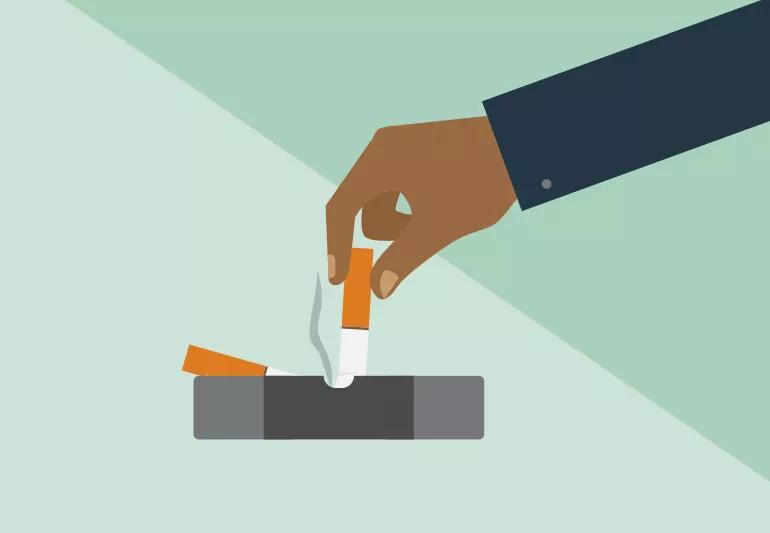One of the most important things you’ll ever do

Image content: This image is available to view online.
View image online (https://assets.clevelandclinic.org/transform/73f48ac3-9357-453c-bc57-366d46360da7/quitTobacco-1181093432-770x533-1_jpg)
An illustration of a person putting out a cigarette.
Tobacco is a tough addiction to beat. But whether you’re a cigarette smoker, cigar smoker, tobacco chewer or a vape or electronic cigarette user, quitting tobacco is one of the most important things you’ll ever do, according to integrative medicine physician Irina Todorov, MD.
Advertisement
Cleveland Clinic is a non-profit academic medical center. Advertising on our site helps support our mission. We do not endorse non-Cleveland Clinic products or services. Policy
The Centers for Disease Control and Prevention (CDC) reports that smoking is responsible for about 1,300 deaths every day and 480,000 deaths per year in the United States. Moreover, the CDC also reports that on average, smokers die 10 years earlier than nonsmokers. Quitting smoking reduces mortality compared with continuing to smoke. Quitting earlier in life also results in greater reductions.
A Journal of the American Medical Association (JAMA) study concluded that among heavy smokers, quitting was associated with a significantly lower risk of heart disease within five years relative to current smokers. However, relative to people who never smoked, former smokers’ cardiovascular disease risk remained significantly elevated beyond five years after quitting.
Dr. Todorov offers helpful tips for quitting using the S.M.A.R.T. method:
Counseling and the use of various treatment options double the chances of beating nicotine addiction for good versus quitting cold turkey.
“Use a program tailored for your success because there is no magic pill to help you quit,” says Dr. Todorov. “Most tobacco users don’t plan to fail but fail to plan. Breaking the habit can be hard and many people need help doing it.”
Advertisement
If you are motivated to quit, talk to your doctor what programs are available in your area.
Motivation for quitting is personal — relieving a financial burden, improving health issues or wanting to be a role model for your kids.
“I like to use a technique called the Five Whys with my patients to help them find the real reason why they want to quit smoking,” says Dr. Todorov. “This is a common problem-solving technique used to find the root cause of why a problem exists.”
To use the Five Whys technique, identify which reasons matter the most to you to help you stop smoking. For example:
“Once you identify why, then you decide when you want to quit,” says Dr. Todorov. “Make your quit day special and plan a trip, volunteer at an event where smoking is not permitted or plan to be busy overall.”
Learn all you can about nicotine addiction and withdrawal, especially about your own personal triggers. This could include stress, boredom, specific situations like always having a cigarette with your coffee or being around friends who chain smoke. Identifying these triggers upfront will help you deal with challenges without relapsing.
“Nicotine addiction is real and it involves both physical and behavioral factors. When you understand both of those aspects, your chances of success are higher,” says Dr. Todorov.
To identify your top reasons for quitting, compare the pros and cons of tobacco use.
For example, pros could be anything from my risk of heart disease and cancer will decrease to saving money and finally taking that trip you always wanted.
“Common cons I have heard are I am afraid that I will fail to quit again, I will lose my friends who smoke and smoking helps me relax,” says Dr. Todorov.
Set a quit date and then commit to living without tobacco.
“Typically, ex-smokers remember the good times when they used to smoke,” says Dr. Todorov. “Instead, look to the future and stop thinking of smoking as an option.”
Find your reason for quitting, surround yourself with people who are supportive of your decision, talk to your doctor about available programs in your area, set up a quit date and start your tobacco-free life journey.
Advertisement

Sign up for our Health Essentials emails for expert guidance on nutrition, fitness, sleep, skin care and more.
Learn more about our editorial process.
Advertisement
Nicotine replacement products and relaxation techniques can help you ditch the dip
When it comes to tobacco use, there is no such thing as ‘safe’
Most recommended precautions center around minimizing bruising or swelling
Even one drink can have an impact on your cognitive function leading to slurred speech, blurred vision and impaired memory
Understand who may (and may not) benefit
Lorem ipsum dolor sit amet. Et odio Quis vel ipsam omnis eum alias deleniti et placeat impedit non voluptas galisum hic autem enim et cupiditate aliquid. Est beatae quidem non facilis autem ut commodi nisi aut tempore rerum et dolores voluptatem cum enim optio id sapiente quasi. Ad laboriosam officiis 33 cupiditate sequi ea voluptatum consectetur qui necessitatibus voluptate et quasi doloremque et facere explicabo quo explicabo officia
Type 2 diabetes isn’t inevitable with these dietary changes
Applying a hot or cold compress can help with pain
Pump up your iron intake with foods like tuna, tofu and turkey